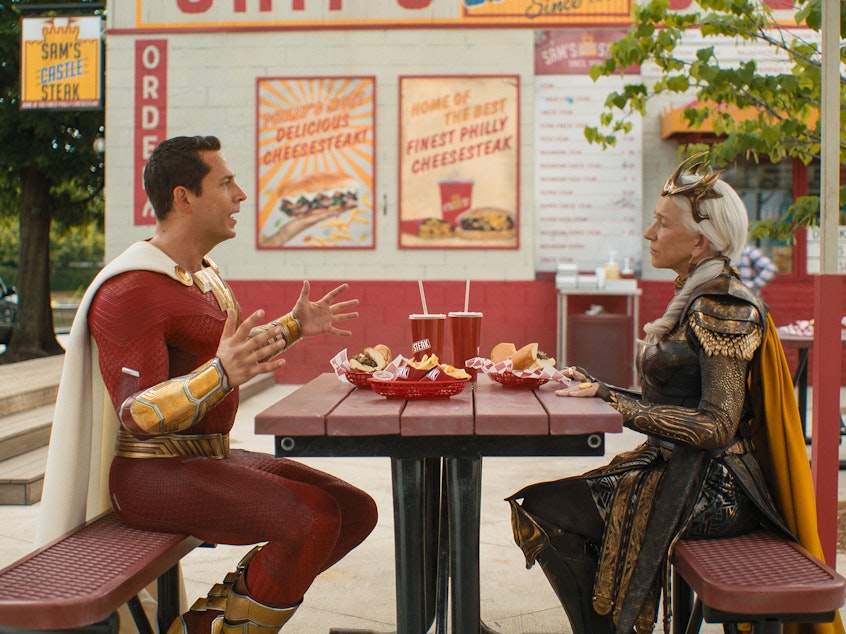'Shazam! Fury of the Gods' is a near myth

The 2019 film Shazam! followed on the heels of Wonder Woman (2017) and Aquaman (2018) — two DC superhero movies that had already managed to step out from under the grim-dark era of filmmaker Zack Snyder, with its muddy, grayish-brown color palette and even muddier, brownish-gray emotional palette.
Yet there was something distinctly bright, fresh and colorful about director David F. Sandberg's movie, which starred Asher Angel as lonely foster kid Billy Batson, who gets granted powers by a mysterious wizard (Djimon Hounsou) that transform him into an adult (albeit naggingly unnamed) superhero played, with bracing gusto, by Zachary Levi.
The idea, then and now, is Tom Hanks' Big-meets superheroes: When he says a magic word, young Billy's body transforms, but his mind stays the same. Thus the film unspooled with its every superhero cliché (training montage, random acts of heroism, climactic battles with various villains) inflected with something new: the heedless joy of a kid being granted a wish. Levi played his superhero as an over-enthusiastic try-hard who was desperate to figure things out. Sure, he tossed out the occasional pop culture reference or wincingly dumb joke, but that resultant doofiness was endearing, novel, fun.
That was then. This is now.
More (big red) cheese
Sponsored
It's apparent quite early that the narrative fuel mixture of Shazam: Fury of the Gods is off. This time out, returning director Sandberg attempts to crank the volume on the first film's breezy goofiness, and succeeds. But that increase in volume introduces distortion: We get more of Levi in the red muscle suit and less — startlingly less — of Angel as teen Billy.
That's only an issue because of what Levi chooses to do with his greater share of screen time, which is to make the sweatiest, schtickiest, most effortful choice, again and again. He mugs. He preens. He goggles his eyes. The performance devolves to one level, one joke, over and over: His character makes a pop culture reference that the film's villain du jour — an ancient god named Hespera, played by Helen Mirren — kind of squints quizzically at.
Repeat that bit once per minute, 130 times, and there's your movie.
There's an attempt to leaven Levi's go-for-the-jugular approach with a character arc. When we meet him, he's suffering from imposter syndrome, as his found family of fellow super beings (including Freddy, played by both Jack Dylan Grazer and Adam Brody) fail to embrace his leadership.
That leadership gets further challenged by the appearance of the daughters of the mythical Atlas (Mirren and Lucy Liu), who seek to reclaim the power he and his friends wield. Big fights happen on and above the streets of Philadelphia (played by Atlanta); sundry zappy standoffs occur amid rubble and rebar.
Sponsored
In the process, between lightning strikes, our hero steps up, learns lessons, and matures.
At least, in theory.
In execution, we just get Levi's invariant antic doofus, from first scene to last.
Twain in vain
In the first movie, it didn't much matter that Levi was clearly making no attempt to modulate his performance by keying any aspect of it to Angel Asher's take on teen Billy. After all, for the first 40 years of his comic book existence, Captain Marvel (for so he was named, until relatively recently) and Billy Batson were written as two different people. Billy said his magic word and was replaced by Cap.
Sponsored
But in the 1980s, the notion arose that Cap was still just Billy inside: a mass of muscle gifted by the gods with amazing powers, yet who retained the personality of a child. That's the tack that the films have taken and if in the first movie there was a sharp disconnect between what the two actors who were ostensibly playing the same role were bringing to the table, it was easy to chalk that up to the gee-whiz whimsy of it all.
Not so anymore. The few glimpses we get of Angel's Billy are now so far afield from anything and everything that Levi is doing that the notion they're playing the same person is easily the least believable thing in a movie in which a unicorn impales a cyclops, a wooden dragon lands atop Citizens Bank Park and Dame Helen freaking Mirren sits down for a cheesesteak.
It's not going to stop 'till you wise up
In the film's defense, it does finally address something the first Shazam! movie breezed over — something that admittedly matters only to a small number of hardcore comic book nerds like me, but matters to us hugely.
SHAZAM, is, canonically, an acronym. Billy gets granted the Wisdom of Solomon, the Strength of Hercules, the Stamina of Atlas, the Power of Zeus, the Courage of Achilles and the Speed of Mercury. SHAZAM, get it? (Yes, I know, this represents a willfully heedless mishmash of pantheons that'd drive any classical/biblical scholar up the wall, but let that go, we're all stuck with it.)
Sponsored
The films depict Levi's character wielding all of these gifts, with the wildly conspicuous absence of the first one.
"Wisdom of Solomon?" The guy's an idiot. How can you possibly square Solomonic wisdom with the sustained level of dumbassery that Levi's serving up?
It may be a small comfort to know that this egregious oversight is acknowledged, addressed and firmly laid to rest in a way that even the least forgiving comic book nerd will grudgingly accede to.
A small comfort, but a comfort all the same. [Copyright 2023 NPR]



